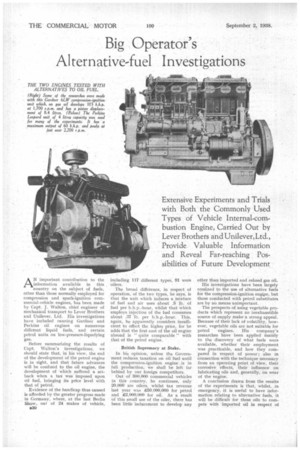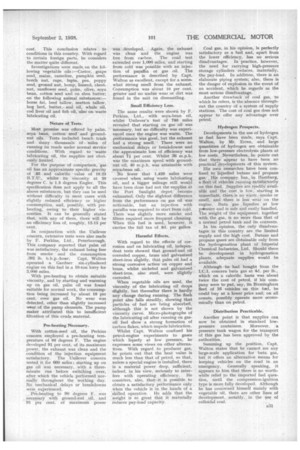Big Operator's Alternative-fuel Investigations
Page 40

Page 41

If you've noticed an error in this article please click here to report it so we can fix it.
AN important contribution to the information available in this , country on the subject of fuels, other than those normally employed for compression and spark-ignition com
mercial-vehicle engines, has been made by Capt. J. Walton, chief engineer of mechanical transport to Lever Brothers and Unilever, Ltd. His investigations have included running Gardner and Perkins oil engines on numerous different liquid fuels, and certain petrol units on low-pressure-liquefying gas.
Before summarizing the results of Capt. Walton's investigations, we
should state that, in his view, the end of the development of the petrol engine is in sight, and that future advances will be confined to the oil engine, the development of which suffered a setback when a tax was imposed upon oil fuel, bringing its price level with that of petrol.
Evidence of the handicap thus caused is afforded by the greater progress made in Germany, where, at the last Berlin Show, out of 24 makes of vehicle, B30 including 117 different types, 01 were oilers.
The broad difference, in respect of operation, of the two types, he says, is that the unit which induces a mixture of fuel and air uses about .5 lb. of fuel per b.h.p.-hour, whilst that Which 'employs injection Of the fuel consumes about .37 lb. per b.h.p.-hour. This, again, he apparently considers insufficient to offset the higher price, for he adds that the first cost of the oil engine abroad is " quite comparable " with that of the petrol engine.
British Supremacy at Stake.
In his opinion, unless the Government reduces taxation on oil fuel until the compression-ignition engine is in full production, we shall be left far behind by our foreign competitors.
Out of 500,000 commercial vehicles in this country, he continues, only 20.000 are oilers, whilst tax revenue last year was £50,000,000 for petrol and 12,000,000 for oil. As a result of this small use of the oiler, there has been little inducement to develop any other than imported and refined gas oil.
His investigations have been largely confined to the use of alternative fuels for the compression-ignition engi,pe, but those conducted with petrol substitutes are by no means unimportant.
The prospects of using vegetable products which represent an inexhaustible source of supply make a strong appeal. Because of their lack of volatility, however, vegetable oils are not suitable for petrol engines. His company's researches have been applied mainly to the discovery of what fuels were available, whether their employment was practicable, and how they compared in respect of power; also tit connection with the technique necessary from an operating point of view, their corrosive effects, their influence on lubricating oils and, generally, on wear of the engine.
A conclusion drawn from the results of the experiments is that, whilst.. in emergency, it is useful to have information relating to alternative fuels, it will be difficult for these oils to compete with imported oil in respect of cost. This conclusion relates to conditions in this country. With regard to certain foreign parts, he considers the matter quite different.
Investigations were made, on the following vegetable oils :—Castor, grape seed, maize, cameline, pumpkin seed, beech nut, rape, lupin, pea, poppy seed, ground nut, hemp, linseed, chestnut, sunflower seed, palm, olive, soya bean, cotton seed and on shea butter; on the following animal substances:— horse fat, beef tallow, mutton tallow, hog lard, butter,. seal oil, whale oil, cod liver oil and fish oil, also on waste lubricating oil.
Nature of Tests.
Most promise was offered by palm, soya bean, cotton seed and groundnut oils.. Tests included bench trials and many thousands of miles of running on roads under normal service conditions. With regard to waste lubricating oil, the supplies are obviously ,limited.
For the purpose of coniparison, 'gas oil has an approximate specific. gravity of .85 •and calorific value of 19.25 B.T.U., whilst its viscosity at 20 degrees C. is 1.5 degrees Engler. This specification does not apply to all the above substances, but they can be used without difficulty in most cases with slightly reduced efficiency or higher consumption, and, possibly, with preheating, owing to their higher viscosities. It can be generally stated that, with any of them, there will be an efficiency loss of, roughly, 12-15 per cent.
In conjunction with the Unilever concern, extensive tests were also made by F. Perkins, Ltd., Peterborough. This company reported that palm oil was satisfactory, the exhaust being free from smoke and the consumption .392 lb. b.h.P.-hour. Capt. Walton operated a Gardner six-cylindered engine on this fuel in a 10-ton lorry for 3,0(t) miles.
With pre-heating to obtain suitable viscosity, and by. starting and warming up on gas oil, palm oil was found suitable for normal work, the consumption being increased by about 10 per cent, over gas oil. No wear was detected, other than slightly increased wear of the pump elements. The pump maker attributed this to insufficient filtration of this crude material.
Pre-heating Necessary.
With cotton-seed oil, the Perkins concern employed a pre-heating temperature of 90 degrees F. The engine developed 91 per cent of its maximum power, the exhaust was clean and the condition of the injection equipment satisfactory. The Unilever concern tested it for 660 miles ; starting up on gas oil was necessary, with a threeminute run before switching over, after which the vehicle performed normally throughout the working day. No mechanical delays or breakdowns were experienced.
Pre-healing to 90 degrees F. was necessary. with ground-nut oil, and 91 per cent. of maximum power
was developed. Again, the exhaust was clean and the engine was free from carbon, The road test extended over 1,096 miles, and starting from cold was possible with an injection of paraffin or gas oil. The performance is described by Capt. Walton as excellent, except for a somewhat strong smell from the exhaust. Consumption was about 10 per cent. greater and no undue wear or, dirt was found in the unit on dismantling.
Small Efficiency Loss.
The same results were shown by F. Perkins, Ltd., with soya-bean oil, whilst Unilever's test of 780 miles revealed that starting on gas oil was necessary, but no difficulty was experienced once the engine was warm. The performance Was good, but the exhaust had a strong smell. There were no mechanical delays or breakdowns and the approximate loss of efficiency was about 7i per cent. Whilst 36 m.p.h. was the maximum speed with groundnut oil, 40 m.p.h. was attainable with soya,,bean oil.
No fewer that 1,420 miles were covered when using waste lubricating oil, and a bigger mileage still would have been done had not the supplies at the Port Sunlight depot become exhausted. Only the slightest difference from the performance on gas oil was noticeable, but an injection with paraffin was required to start from cold. There was slightly more smoke and filters required more frequent cleaning. When this fuel is used, however, it carries the full tax of 8d. per gallon.
Harmful Effects.
With regard to the effects of corrosion and on lubricating oil, independent tests showed that ground-nut oil corroded copper, brass and galvanized sheet-iron slightly, that palm oil had a strong corrosive action on copper and brass, whilst nickeled and galvanized sheet-iron, also steel, were slightly corroded.
When vegetable oils are used, the vistosity of the lubricating oil drops slightly, but thereafter there is hardly any change during running. The flash point also falls steadily, showing that particles of fuel are being absorbed, although this is not shown by the viscosity curve. Micro-photographs of the lubricating oil after running on gasoil fuel show a strong formation of carbon flakes, which impede lubrication.
Whilst Capt. Walton confined his petrol-engine experiments to gases which liquefy at low pressure. he expresses some views on other alternatives. With regard to producer gas, he points out that the heat value is much less than that of petrol, so that, unless a special engine is installed, there is a material power drop, sufficient, indeed, in his view, seriously to interfere with operating efficiency. He considers, also, that it is possible to obtain a satisfactory performance only. when the vehicle is in the hands of a 'skilled operative. He adds that the weight is so great that if materially reduces pay-load capacity. Coal gas, in his opinion, is perfectly satisfactory as a fuel and, apart from the lower efficiency, has no serious disadvantages. In practice, however, the need for carrying high-pressure storage cylinders reduces, materially, the pay-load. In addition, there is an elaborate piping system; also, there is the danger of explosion in the event of an accident, which he regards as the most serious disadvantage.
Another drawback of coal gas, to which he refers, is the absence throughout the country of a system of supply stations. The cost of coal gas does not appear to offer any advantage over petrol.
Hydrogen Prospects.
Developments in the use of hydrogen as fuel have been made, says Capt. Walton, by Mr. Erren, and large quantities of hydrogen are obtainable from low-pressure electrolysis plants at low costs. Nevertheless, he points out that there appear to have been no practical' developments of this system.
His own researches have been confined to Liquefied butane and propane gas. His company has, in Hamburg, a fleet of vehicles running sa.tisfaCtorily on this fuel. Supplies are readily available and the cost is low, starting is immediate, there is no waste, smoke or smell, and there is less wear on the engine. Buts, gas liquefies at low pritssure and is safe and easily handled. The weight of the equipment, together with the gas, is no more than that of a normal petrol tank and its contents.
In his opinion, the only disadvantages in this country are the limited supply and the high cost. Butane and propane gases are Obtainable only from the hydrogenation plant of Imperial Chemical Industries, Ltd. Should there be " development in hydrogenation plants, adequate supplies would be available.
Although he had bought from the 1,.C.1. concern buta gas at 4d. per lb., which on a calorific basis was about twice the cost of petrol, if his coinpa.ny were to put. say, its Birmingham fleet of 16 vehicles on this fuel, he could buy at a lower price and, on all counts, possibly operate more economically than on petrol.
Distribution Practicable.
Another point is that supplies can now be obtained in standard lowpressure containers. Moreover, a pressure tank wagon for the transport of this gas has been approved by the authorities.
Summing up the position. Capt. Walton states that he cannot see any large-scale application for buta gas, but it offers an alternative means for keeping vehicles on the road in an emergency. Generally speaking, it appears to him that there is no worthwhile relief pa the imported fuel question, until the compression-ignition type is more fully developed. Although he has concerned himself mainly with vegetable oil, there are other lines of development, notably, in the use of colloidal coal.




















































































